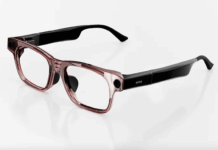HTC is once again attacking the wearable device market with the release of a new model of smart glasses, as the company itself has announced. Vive Eagle is a competitor to Meta’s Ray-Ban glasses, featuring a stylish, lightweight design, open audio, AI voice control, and an AI-powered ultra-wide camera. They look promising, albeit a little pricey, but will initially only be available in Taiwan.
The Taiwanese company clearly noticed that Meta’s Ray-Ban smart glasses became an unexpected hit. The current model is equipped with built-in headphones, cameras, microphones, and access to Meta’s virtual assistant.
HTC used almost the same formula for Vive Eagle, although they will have to fight hard with the Ray-Ban brand in terms of consumer recognition and style. “Vive Eagle features a sophisticated aesthetic that hides powerful technology behind clean, minimalist lines,” the company wrote. It managed to fit all the technology into a relatively lightweight frame that weighs only 49 grams, just one gram heavier than Meta’s Ray-Bans.
As for the camera, Vive Eagle is equipped with a 12-megapixel ultra-wide-angle camera with AI voice control that supports multiple platforms, including OpenAI and Gemini. “With a simple voice command, such as ‘Hey VIVE, take a photo,’ users can capture what they see directly from their glasses,” the company writes.
Voice commands also allow you to perform actions such as recording reminders, creating notes, and getting restaurant recommendations. You can also get real-time translation in 13 languages: Arabic, Traditional Chinese, English, French, German, Greek, Italian, Japanese, Portuguese, Spanish, Korean, Thai, and Turkish.
When it comes to audio, Vive Eagle has an open design that “combines large acoustic drivers and virtual bass enhancement to deliver rich, spacious sound while minimizing sound leakage,” HTC says. The company promises that you will be able to listen to music or voice prompts without disturbing those around you, while still being aware of what is happening around you.
HTC promises up to 36 hours of standby time and 4.5 hours of continuous music playback thanks to a 235 mAh battery, and you can charge the device to 50% in 10 minutes (using magnetic fast charging). It also features a “privacy-first” architecture, in which all videos and other data are stored exclusively on the device and protected by 256-bit AES encryption, according to HTC.
Vive Eagle will initially be available only in Taiwan at a price of 15,600 Taiwanese dollars, or about US$520 — significantly more expensive than most Ray-Ban models from Meta. HTC has not yet announced whether it will sell Vive Eagle in other regions, including the US, but if it does, it will be difficult for it to compete with its rival at this price point.









